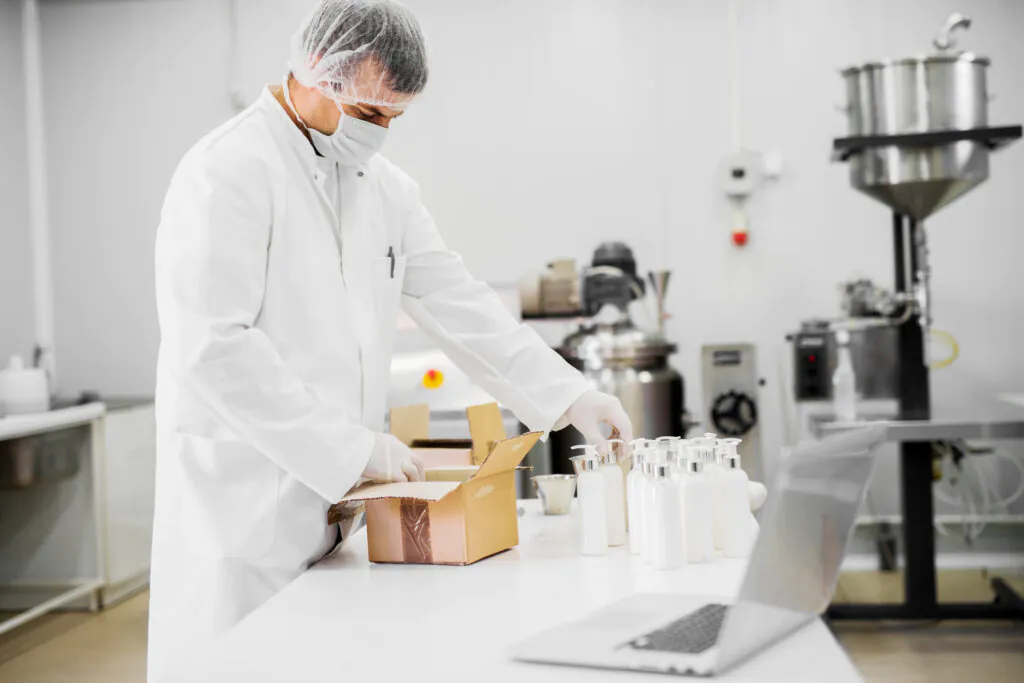Author: Sudeshna Ghosh
Introduction to Smart Packaging
The growth in the global pharmaceutical industry will be driven by safety concerns and the ability of products to fit in the loop of connectivity and communication. Smart labels, QR scanning, brand protection, and identification are some of the aspects that indicate that the smart packaging industry needs to evolve constantly to serve all product-shipping business verticals, including pharmaceuticals.
One of the key challenges faced by pharma companies today involves the increasing cost of bringing new formulas into the market. In the case of generic medicines, competition is becoming fierce. Furthermore, companies in the sector are increasingly experiencing pharmaceutical logistics challenges such as shortcomings relating to drug expiry date management, counterfeiting issues that jeopardize the quality of care, and product degradation and recalls. A lot of effort is being put in by players in the sector to re-design the pharma value chain and turn these roadblocks into opportunities. Among the several advanced techniques used by pharma companies for enhancing performance, smart packaging has been a breakthrough. Smart packaging is an advanced packaging system that can monitor changes in a product or its environment and help pharma companies act upon these changes. Sensor-equipped smart packaging in the pharma industry can help track a product along the supply chain to the end user.
Top Benefits of Smart Packaging in the Pharma Industry
Smart packaging in the pharmaceutical industry offers numerous benefits that enhance safety, efficiency, and patient engagement. Here are some of the top advantages:
Temperature Control:
Smart packaging enables real-time monitoring of temperature, ensuring medicines are stored safely and effectively.
Adherence to Medication:
NFC tags in smart packaging remind patients to follow their prescriptions and provide interactive information via smartphones.
Stock Control:
Sensors in smart packaging help pharmaceutical companies manage inventory levels, preventing understocking and overstocking.
Enhances Clinical Trials:
Smart packaging records medication consumption times, improving patient compliance and data accuracy during clinical trials.
Improved Traceability and Transparency:
Technologies like RFID and QR codes enhance tracking throughout the supply chain, ensuring product authenticity and safety.
Increased Efficiency and Cost Savings:
Automation in packaging processes reduces manual errors, leading to operational efficiency and cost savings for pharmaceutical companies.
Sustainability and Environmental Impact:
Smart packaging minimizes waste and promotes eco-friendly solutions, aligning with sustainability initiatives in the pharmaceutical industry.
Temperature control
If medicines are not stored at the right temperature, it can not only lead to product damage but can also prove to be dangerous for consumption. With smart packaging solutions for the pharmaceutical industry, it is now possible to create labels informing about a product’s temperature during the shipping process and storage. This helps doctors, pharmacists, or patients to determine whether the drugs are safe to take or not.
Adhering to medication
Smart packaging for pharma products is a great way of reminding patients about adhering to the prescription. NFC tags used in smart packaging provide patients with enough information so that they know they are using the drug as intended. The information is often delivered interactively on the patient’s smartphone, for instance via video.
Stock control
Smart packaging will be beneficial for pharma companies to keep tabs on their stock and manage their inventory levels better. The sensors in smart packaging allow companies to check the stock level available with them and adjust the production and supply accordingly to prevent situations of understocking or overstocking.
Enhances clinical trials
Smart packaging solutions for clinical trials are largely focused on patient compliance and engagement. Sometimes, during a clinical trial, enrolled patients typically need to maintain records that document their drug administration. Many don’t take the time to do that in real-time and, as a result, their data is subject to error. Smart packaging aims to avoid such errors by notifying the patients to take the medicine on time and recording the exact time that the medicine was consumed.
Improved Traceability and Transparency
Smart packaging enhances traceability throughout the supply chain. With technologies like RFID and QR codes, stakeholders can track the movement of pharmaceutical products from manufacturing to delivery. This transparency helps identify potential issues quickly, ensuring that products are authentic and safe for consumers.
Increased Efficiency and Cost Savings
By automating various packaging processes and reducing manual errors, smart packaging contributes to operational efficiency. This leads to significant cost savings for pharmaceutical companies, as they can optimize resource utilization and streamline their supply chain operations.
Sustainability and Environmental Impact
Smart packaging can support sustainability initiatives by minimizing waste and optimizing logistics. By extending the shelf life of products and reducing spoilage, smart packaging helps decrease the environmental footprint associated with pharmaceutical waste. Additionally, it can promote eco-friendly packaging solutions, aligning with the industry’s growing focus on sustainability.
These benefits collectively demonstrate how smart packaging is transforming the pharmaceutical industry, enhancing safety, compliance, efficiency, and environmental responsibility.
Key Technologies Used in Smart Packaging
Smart packaging is an innovative approach that integrates advanced technologies into packaging solutions to enhance product safety, traceability, and consumer engagement. This evolution is transforming various industries, including food, pharmaceuticals, and consumer goods, by providing real-time data and improving supply chain efficiency. Key Technologies used in Smart Packaging include:
-
RFID and NFC Tags:
Enable wireless data transmission about a package's location and contents, facilitating real-time tracking and inventory management.
-
Printed Sensors:
Thin adhesive strips that monitor conditions like temperature and humidity, providing crucial data without bulky electronics.
-
Active Packaging:
Interacts with its contents to extend shelf life, such as oxygen absorbers that prevent spoilage and maintain quality.
-
Chemical Indicator Inks
Change color in response to specific conditions (e.g., temperature or pH), indicating product integrity and safety.
-
Time Temperature Indicators (TTIs):
Visual devices signal if a product has been exposed to harmful temperature conditions during transport.
-
Blockchain Technology:
Provides transparent and tamper-proof tracking of products throughout the supply chain, enhancing trust and authenticity.
-
Robotics:
Automates packaging processes, improving efficiency and reducing human error in production and distribution.
-
3D Printing:
Allows for customized packaging designs that reduce waste and improve sustainability through innovative manufacturing methods.
In a nutshell, smart packaging technologies are revolutionizing how products are packaged and delivered, offering significant benefits in terms of efficiency, sustainability, and consumer interaction. As these technologies continue to evolve, they will play a crucial role in shaping the future of packaging across various sectors.
Future of Smart Packaging in the Pharma Industry

The future of smart packaging is poised for significant advancements, driven by the integration of innovative technologies such as IoT, biosensors, and nanomaterials. These developments will enhance product safety, extend shelf life, and improve supply chain transparency. As industries like food and pharmaceuticals increasingly adopt smart packaging solutions, the focus will shift towards sustainability, reducing waste, and optimizing logistics. The market is expected to grow substantially, with projections indicating a rise in demand for intelligent and active packaging systems that not only protect products but also engage consumers through real-time data and interactive features. Overall, smart packaging is set to redefine consumer experiences and operational efficiencies across various sectors, aligning with the broader trends of Industry 4.0 and digital transformation.
Real-World Examples
- Pfizer: Incorporates NFC (Near Field Communication) tags for product authentication and patient engagement.
- Novartis: Uses QR codes and sensors to monitor medication adherence and ensure product integrity.
- Merck: Implementing temperature-sensitive smart packaging for biologics to ensure cold chain integrity.
- Roche: Uses RFID (Radio-Frequency Identification) to track and trace products through the supply chain.
- GSK (GlaxoSmithKline): Employs smart blister packs with electronic sensors to monitor patient compliance.
| Case Study: Enhancing Pharmaceutical Supply Chain Integrity through Smart Packaging – A Collaboration between Infiniti Research and a Leading Pharmaceutical Company |
| Background: Our client, a prominent global pharmaceutical company with a portfolio of life-saving drugs, faced significant challenges in ensuring the authenticity, safety, and compliance of its products across international markets. As the company expanded its reach, it became increasingly vulnerable to counterfeit drugs, especially in emerging markets. This issue not only posed a threat to patient safety but also risked damaging the company’s brand reputation. To address these challenges, the company sought to explore innovative solutions, particularly in the realm of smart packaging. |
| Solution: Infiniti Research was engaged to develop a comprehensive smart packaging strategy tailored to the pharmaceutical industry’s unique challenges. Our approach involved the following key steps: Market Analysis and Technology Assessment: Conducted an in-depth analysis of the latest advancements in smart packaging technologies, including RFID, NFC, and QR code integration. Assessed the regulatory landscape across different markets to ensure compliance with regional guidelines for pharmaceutical packaging. Customized Smart Packaging Solution: Collaborated with the client’s R&D and supply chain teams to design a smart packaging solution that incorporated RFID tags for real-time tracking and NFC-enabled authentication features. Developed a user-friendly interface for pharmacists and healthcare providers to verify product authenticity, ensuring patient safety and trust. Pilot Testing and Implementation: Conducted a pilot program across select markets, integrating smart packaging into the company’s existing supply chain. Monitored the effectiveness of the solution in preventing counterfeiting, ensuring temperature control, and enhancing patient compliance through interactive packaging. Data Analytics and Continuous Improvement: Leveraged data analytics to track the performance of the smart packaging solution, identifying areas for continuous improvement. Provided actionable insights to the client, helping them refine their supply chain strategies and improve overall efficiency. |
| Results: The collaboration between Infiniti Research and the pharmaceutical company yielded significant results: Enhanced Supply Chain Integrity: The implementation of smart packaging technology dramatically reduced the incidence of counterfeit drugs, particularly in high-risk markets, by enabling real-time tracking and authentication. Improved Patient Safety and Compliance: The integration of NFC technology and interactive packaging features empowered healthcare providers and patients to verify the authenticity of drugs, leading to increased patient confidence and adherence to prescribed medication regimens. Regulatory Compliance and Market Expansion: The client successfully navigated complex regulatory environments across multiple regions, ensuring compliance while expanding its market presence. Brand Protection and Reputation Management: The smart packaging initiative reinforced the client’s commitment to safety and quality, strengthening its brand reputation globally. This case study demonstrates Infiniti Research’s ability to deliver tailored, innovative solutions that address the specific challenges faced by pharmaceutical companies in today’s complex global market. |
Conclusion
Smart packaging is set to revolutionize the pharmaceutical industry by enhancing product safety, improving supply chain efficiency, and combating counterfeiting. By integrating technologies such as RFID, NFC, and QR codes, smart packaging enables real-time tracking and monitoring of medications, ensuring they are stored and transported under optimal conditions. This innovation not only enhances patient adherence through interactive features but also provides critical data for manufacturers to maintain product integrity. As the industry increasingly prioritizes sustainability and transparency, smart packaging will play a pivotal role in shaping the future of pharmaceutical logistics and patient care, ultimately leading to improved health outcomes.


